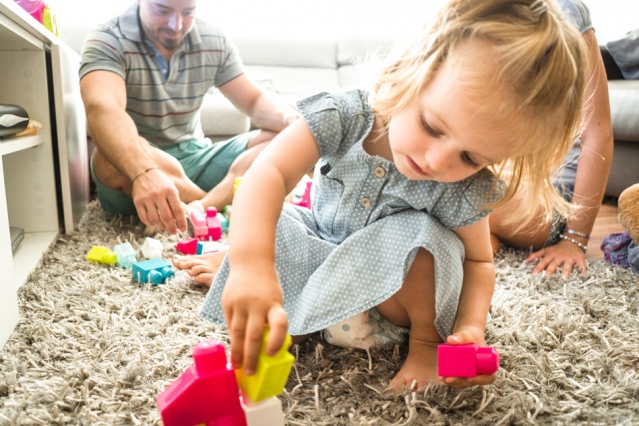Study finds infants try harder after seeing adults struggle to achieve a goal.
Source: [MIT News Office, Anne Trafton | September 21, 2017]

Researchers found that babies who watched an adult struggle to complete tasks before succeeding tried harder at their own difficult task, compared to babies who saw an adult succeed without effort.
If at first you don’t succeed, try, try again.
A new study from MIT reveals that babies as young as 15 months can learn to follow this advice. The researchers found that babies who watched an adult struggle at two different tasks before succeeding tried harder at their own difficult task, compared to babies who saw an adult succeed effortlessly.
The study suggests that infants can learn the value of effort after seeing just a couple of examples of adults trying hard, although the researchers have not studied how long the effect lasts. Although the study took place in a laboratory setting, the findings may offer some guidance for parents who hope to instill the value of effort in their children, the researchers say.
“There’s some pressure on parents to make everything look easy and not get frustrated in front of their children,” says Laura Schulz, a professor of cognitive science at MIT. “There’s nothing you can learn from a laboratory study that directly applies to parenting, but this does at least suggest that it may not be a bad thing to show your children that you are working hard to achieve your goals.”
Schulz is the senior author of the study, which appears in the Sept. 21 online edition of Science. Julia Leonard, an MIT graduate student, is the first author of the paper, and MIT undergraduate Yuna Lee is also an author.
Putting in the effort
Many recent studies have explored the value of hard work. Some have found that children’s persistence, or “grit,” can predict success above and beyond what IQ predicts. Other studies have found that children’s beliefs regarding effort also matter: Those who think putting in effort leads to better outcomes do better in school than those who believe success depends on a fixed level of intelligence.
Leonard and Schulz were interested in studying how children might learn, at a very early age, how to decide when to try hard and when it’s not worth the effort. Schulz’ previous work has shown that babies can learn causal relationships from just a few examples.
“We were wondering if they can do similar fast learning from a little bit of data about when effort is really worth it,” Leonard says.
To do that, they designed an experiment in which 15-month-old babies first watched an adult perform two tasks: removing a toy frog from a container and removing a key chain from a carabiner. Half of the babies saw the adult quickly succeed at the task three times within 30 seconds, while the other half saw her struggle for 30 seconds before succeeding.

